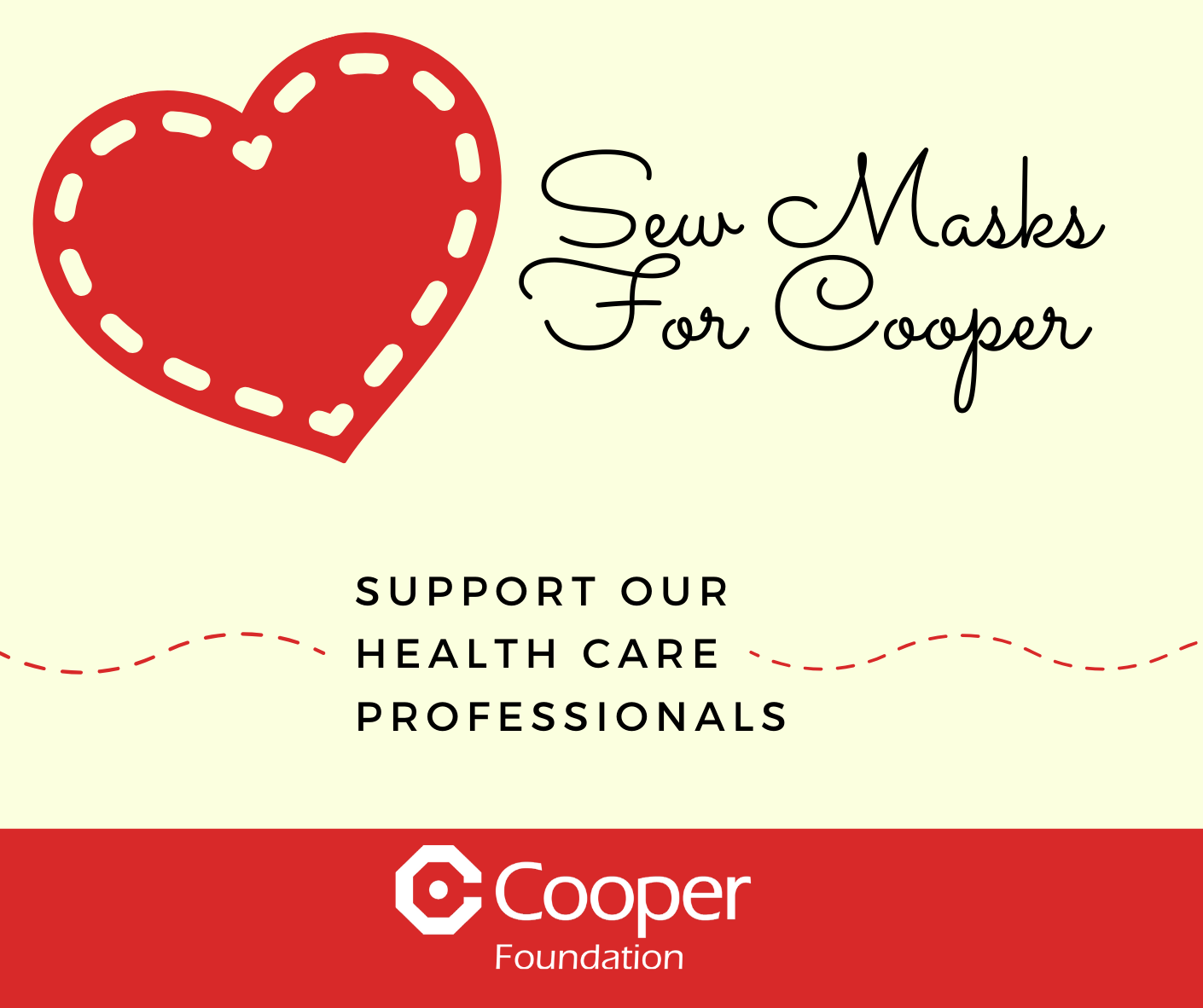 Cooper University Health Care currently has an adequate supply of masks, however they remain in short supply nationwide due to COVID-19.
Cooper University Health Care currently has an adequate supply of masks, however they remain in short supply nationwide due to COVID-19.
Cooper is looking to be proactive in addressing the possibility of future supply challenges and is calling on all sewing volunteers to help make masks. Our hope is that we won’t need them, but we must plan for the unknown.
Fabric masks offer the benefit of being able to be washed and re-used as each health care worker will need to change their mask several times during their shifts for maximum protection, when the mask becomes soiled or damp.
We aren’t worried about looking stylish, but we are concerned about functionality.
Non-matching fabrics, thread, binding strips are just fine – but the masks need to be well-sewn, with no frayed edges, missed seams, or “holes.”
How-To
To ensure that the masks are as safe and as effective as possible, we ask that you following the following guidelines:
- Consistency is important. Please use this pattern: Easy to Sew® Face mask with filter pocket with instructions https://www.youtube.com/watch?v=zoPSXaLKCNE. This pattern provides for the most wide-based fit and includes a filter pouch where we can enclose a disposable filter to increase its efficiency.
- Recommended fabrics for the outer portion of the mask include heavier, non-stretch materials, such as:
- denim
- duck cloth
- canvas
- twill
- or other tightly woven fabric.
- Recommended fabrics for the inner lining and filter pocket can be 100% cotton or cotton blend, non-stretch fabric. It can be thinner and softer, but again we please use minimal-stretch or non-stretch fabrics.
- Polyester or other less breathable fabrics will not work for the masks, because moisture produced during breathing becomes collected on the fabric rendering the mask unusable.
- We ask that you pre-wash the fabric, which will preshrink the material and ensure that the fit will be appropriate in the final product.
- If elastic is used, it should be in good shape, with plenty of stretch, and of an appropriate size to fit over the ears – 1/16” round cord or 1/8” braided work best.
- While elastic will work, cloth ties are preferred as they ensure a better fit and make the masks more comfortable to wear for prolonged periods. The fabric ties should be sewn on the mask. There will need to be four (4) ties – one tie on each of the four corners. Ties should be approx. ¼” in width, sewn in such a way that there are no frayed edges, and long enough to be tied into a bow on the top of the head for the top corner and behind the head for the bottom corner.
- The 3.5” to 4” plastic-coated bendable strip across the top of the masks is important so that the user can bend the strip to create a close fit over the nose. Two 4” plastic-coated twist ties work well. Paper twist ties do not hold up to washing. Amazon has packs of 200+ plastic-coated twist ties available for a reasonable price if you or a group are making a large number of masks.
- Extra wide double-bias tape can be purchased. It is also easy to make if you prefer, or if supplies are limited. There are instructions and videos online for creating your own double-bias tape.
Completed Masks
Completed masks should be enclosed in a plastic bag or a closed plastic box.
To arrange to drop off donations, or for questions, please email COVID19Assistance@cooperhealth.edu. For more information about donating to The Cooper Foundation’s COVID-19 Assistance Fund, please click here.

Question with the outer fabric being heavier: denim… Are they too hot for the nurses?
Thank you for your question! Please email COVID19Assistance@cooperhealth.edu and the Cooper Foundation will be able to answer.
I’ve been coordinating with Virtua and Cooper nurses. I get my fabric today and will dust off my sewing machine!!!
Wonderful! Thank you for your support!
Who will be reusing these masks? Are MD Anderson Chemo Buddies included?
Receiving not reusing
We’re Six Feet Apart, but Closer Than Ever – Weekly Rounds
[…] For the Cooper-approved guidelines for hand-sewn masks, visit https://blogs.cooperhealth.org/news/2020/03/sewing-and-donating-masks-for-our-cooper-teams/. […]
Supporting Our Heroes on the Front Line – Weekly Rounds
[…] For the Cooper-approved guidelines for hand-sewn masks, click here. […]
The 3 Ms – Weekly Rounds
[…] Click here for the Cooper-approved guidelines for hand-sewn masks. […]
We Made a Call for Help and Our Community Answered! – Weekly Rounds
[…] For the Cooper-approved guidelines for hand-sewn masks, click here. […]